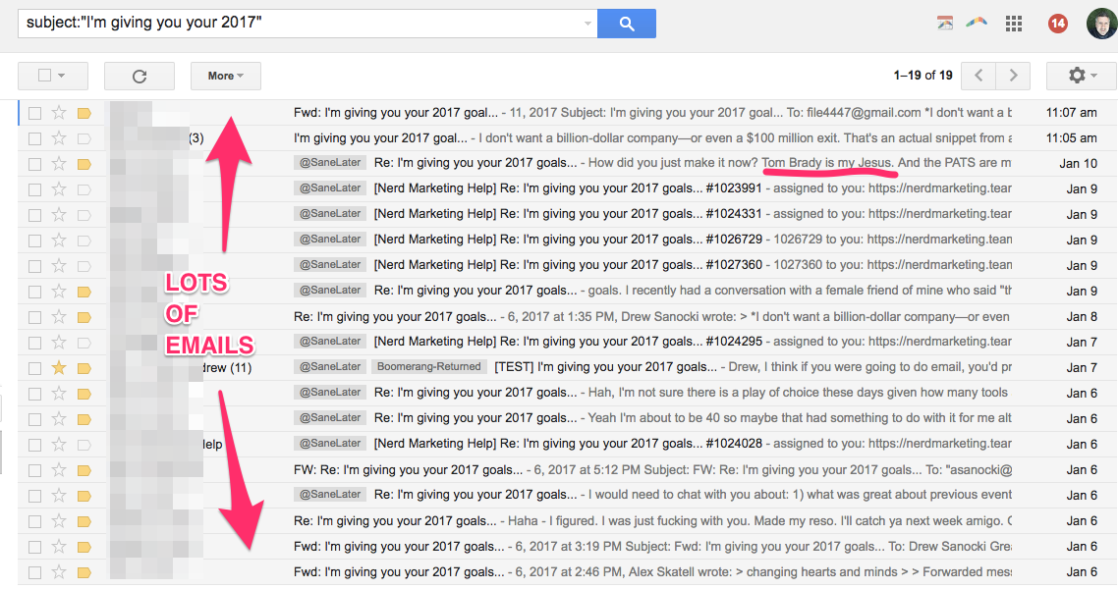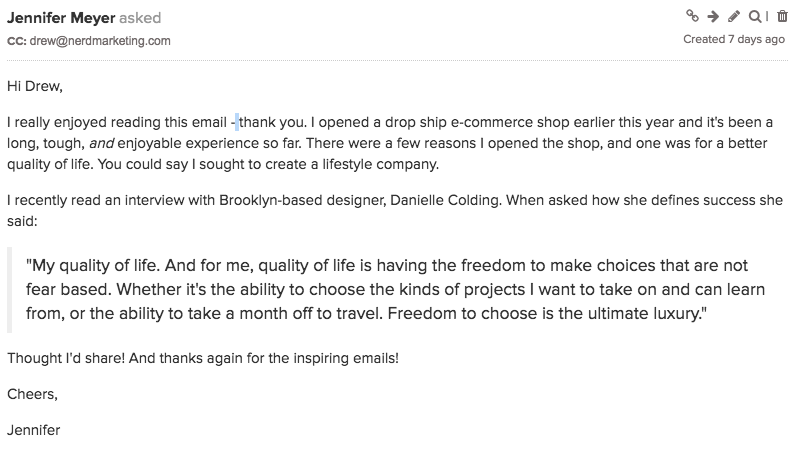I struck a nerve with my recent post on lifestyle businesses.
Usually, when I send out an email about — ahem — marketing and stuff, I am lucky to get two or three responses.
And those are out of office replies.
But last week I hit “send” on Friday and woke up Saturday to this:

Dang.
I guess you all think about this concept of a lifestyle business as much as I do.
Ryan (successful 7-fig brand) has this to say:

Jeff (successful 7-fig app) has this to say:

And I love how Jennifer puts it:

These represent a few out of hundreds of replies.
Today I want to take this concept to the next level. I want to start getting you there. But first I want to clear up a couple of things about the lifestyle business concept.
First, a lifestyle business does not have to be a small business.
Many of you voiced some variation of this comment, from fellow Pats fan Reid:

I get it Reid — you are young, hungry, and not ready to “settle” for a lifestyle business at this point.
But that idea implies that lifestyle businesses cannot be big, ambitious businesses.
I was speaking to Mike Maher, founder of Taylor Stitch yesterday. His business:
- is one of Shopify’s top stores,
- generates 8-figures of revenue,
- has an on- and off-line footprint,
- probably gets confused with Taylor Swift a lot,
- employs a lot of people and
- is a cool brand.
So big, right? And ambitious.
His focus this year? Implementing the process documents and talent to free up his time. That’s right — it’s a lifestyle business by my definition.
Same for Kevin who runs a great 7-8 figure brand:

Hey, a lifestyle business can be a big-ass business, folks. No need to skimp.
Second, a lifestyle business does not mean you forgo a (big) exit.
Some of you voiced this concern: I buy into the concept, but you should still gun for a big exit.
This is a valid concern. You might enjoy your day-to-day at a lifestyle business, but what if there’s no gold at the end of the rainbow?
What we are talking about here is means and ends, process and outcome.
Focus too much on the process (the lifestyle business), you might miss out on the outcome (the exit).
I get that, but the bigger danger is the opposite. You do not want to slave away for years, sacrificing health and relationships, in hopes of achieving an exit that never comes.
Witness David’s experience:

Ouch. That scenario is more common than you’d expect.
On the other hand, my friend Bryan ran an 8-figure lifestyle business for around 15 years. During those years he lived in Spain two months every year, spent time with his kids and family, and worked when he wanted to, where he wanted to.
Then, due to market dynamics, he shuttered the business. No exit. No “outcome” . . . but Bryan sure as hell enjoyed the process.
Ideal case? You both enjoy the process and have a nice outcome at the end. I’ll deep-dive on exits and how to increase the odds today of having a good one tomorrow in another post. But for now, realize that both are possible. You can run a lifestyle business and sell it some day for a significant sum.
Now, next steps
If you are still reading, I assume you are on board with the concept of a lifestyle business. At Nerd Marketing my goal this year is to get you there.
The first critical step is defining where there is.
You see most of us set ambiguous goals. “I want more money.” Well how much more? “I want to meet someone.” Well, what’s he or she like? How will you know when you meet him or her?
If you don’t know what success is, you won’t know when you’ve achieved it. You will default right back to focusing on ambiguous things like “growth.”
So I want you to define a very specific lifestyle business goal for 2017. To do that, answer the following questions:
- Who. Who are you working with? A team or yourself? Are you surrounded by a bunch of idiots or a bunch of people who you enjoy being around? Who are your customers? Do you love them? Hate them?
- What. What does a typical day look like? Are you digging deep into design or creation? Humping a bunch of boxes around a warehouse? What do you want to spend your time on?
- Where. Where do you work? From home? From coffee shops? From a killer office?
- Why. Why do you work? What’s your business doing?
- When. When do you work? 24-7? Four hours a week?
- How. How do you work? Do you have a structured workday? An open-ended one? And most important, how much do you want to make? What’s the exact number that this business needs to pay you each month? Think like Vijay who sent me this goal.
Your answers to these questions will give us something to work with. Remember — no need to “think small” either, lifestyle businesses can be big.
Moreover, expect your goals to change over time. Here’s a table with an example of my current answers to those questions along with what my answers looked like twenty years ago:
| The Question | Family Drew at 45 | Single Drew at 25 |
|---|---|---|
| Why do I work? | I work to enable a fulfilling balanced life. So that my family and I can enjoy each other and explore the world together. | I work largely to make myself more attractive to women. I suspect women dig successful entrepreneurs so I want to be one. |
| Who am I working with? | Just me and a small group of really smart, inspiring people. | A large team — I want to lead a large group of people. |
| What am I doing each day? | Each day is a blank slate. I work from a home office, downtown office, or even coffee shops. I value the flexibility. That way when my kids get up and projectile vomit all over the living room, I can stay at home and lend a hand getting things cleaned up and not be stressed that I’m missing a big meeting. With more flexibility, I can also skip work and instead go to Chuck E. Cheese birthday parties, do stuff my wife wants me to do, and get my kids out of the habitrail tubes at Chuck E. Cheese when they get stuck in there. | Each day is a blank slate. I take my vespa to work and might stop to sip an espresso along the way. When I get in the office, I read the paper, then marketing blogs, then focus on creation — creating new campaigns or product ideas or systems. |
| When do I work? | I enjoy work; I don’t want to minimize it. I just want balance: five days a week, five hours a day. I want to leave the office by 4pm because I enjoy picking my son up at school and then cooking a healthy dinner for the family. And when I go home, I’m done — I don’t want to open my laptop or check my phone. | Screw cooking for a family, are you kidding me? I want to eat out at places in SoHo each night, like Nobu or Raoul’s, followed by gallery openings and late night eats at Florent. I work whenever I want. I keep my phone on all weekend because that’s when chicks text me, and I need to be “on.” |
| Where do you work? | I work from a beautiful downtown office. It’s an inspiring space with great furniture and views of Manhattan. | “Inspiring space”? OK start the boring chant. You gotta be kidding me — I’d rather be poolside in Ibiza or trying to convince the local women I am Jack Dorsey while sitting in a cafe in Paris. |
Main takeaway here? Twenty-five year old Drew was far more interesting than forty-five-year-old Drew.
Secondary takeaway? There are many different flavors of lifestyle business. You won’t be able to get yours, though, unless you define what you want.
This post has been going on long enough, but I get carried away with these things. We’ll pick it up next week with an action plan to get there from here.
For now define that goal and have a great week!
